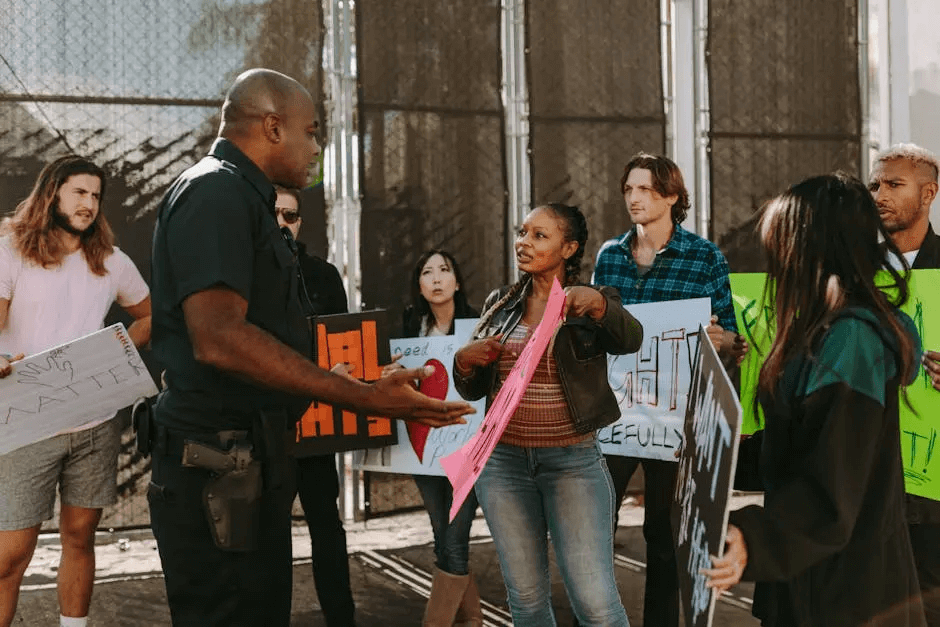
Navigating encounters with law enforcement can often be confusing, especially when it comes to understanding your rights and obligations. In Virginia, knowing when you’re required to show identification to a police officer is crucial. This blog aims to clarify these legal requirements in an easy-to-understand manner, so you can handle such situations confidently.
In Virginia, if you’re driving, you’re legally required to show your driver’s license when stopped by police. This is a standard procedure and failing to do so could result in fines or further legal issues. Let’s delve into what exactly is required during a traffic stop.
Traffic stops in Virginia are some of the most common encounters individuals have with law enforcement. During such stops, the expectation is clear: drivers must hand over their driver’s license, as well as provide vehicle registration and proof of insurance, when requested by a police officer.
These requirements are foundational to traffic law in the state and allow officers to make necessary checks to ensure the vehicle is not stolen and that the driver is legally allowed to operate a vehicle. Beyond legality, these interactions are also important for road safety. It’s interesting to note how diverse factors like daytime or night-time stops can influence an officer’s decision to request further identification. While this basic obligation is well-understood, some find it confusing when additional documents or information are requested. Always remember that cooperative interactions with police may swiftly bring these checks to a close, but knowing your rights can redefine the experience.
When you’re walking around town and approached by an officer, the rules differ from when you’re in a vehicle. In Virginia, there is no Stop and Identify statute for pedestrians, meaning you are not legally obliged to present identification during casual encounters, unless there’s a reasonable suspicion of criminal activity.
Pedestrian encounters with law enforcement often carry more ambiguity. Unlike traffic stops, the scenario where you’re simply walking down the street and approached by a police officer presents a different set of rules. In Virginia, the absence of a Stop and Identify law means that if you are merely a pedestrian without suspected involvement in unlawful activities, law enforcement officers cannot compel you to present identification. It’s essential to ascertain the officer’s intentions and whether you are being detained or are free to walk away. However, retaining your personal rights during these situations may require discernment and composure, especially if the encounter’s purpose is unclear. By asking clear questions respectfully, such as ‘Am I free to go?’ you can better navigate the situation without misunderstanding.
Public gatherings can sometimes lead to police interactions. Understanding your ID obligations in these scenarios is important, especially given the nuances of Virginia law and your rights at public events and protests.
Attending public events or protests is a civic right, but these scenarios can lead to complex interactions with law enforcement. The critical point to remember during these times is your right to assemble and express free speech, while also being aware of specific circumstances where identification might become mandatory.
For example, if a public gathering is deemed unlawful or if there’s reasonable suspicion of criminal behavior, officers may demand IDs from those involved. It’s wise to be informed about the location-specific ordinances, as they can affect police activity during such events. Knowing your rights includes not only understanding when to show ID but also recognizing what constitutes lawful police conduct under public assembly regulations.
While understanding the general guidelines is helpful, there are specific situations where you might still be required to identify yourself. This section covers exceptions, such as involvement in suspected criminal activities or breaches of peace.
Certain exceptions to the general rule of not showing ID exist, particularly in cases involving law enforcement’s reasonable suspicion. If you’re part of an incident the officer believes has criminal elements, you may be required to identify yourself. The presence of reasonable suspicion can be due to observed behavior or the context of a situation, like being in a high-crime area at unusual hours. Under such circumstances, the legal threshold gives officers the authority to ensure public safety. Furthermore, your responsibilities may change if you’re at a location under stringent security measures like airports or government buildings, where ID presentation is standard due to federal regulations. It is crucial to differentiate between these specific conditions and everyday scenarios where refusal to provide ID is within your rights.
Knowing your rights is half the battle; being prepared for a police encounter can make a significant difference. Here are some practical tips and advice to help you stay calm and assert your rights effectively during interactions with law enforcement in Virginia.
Remaining calm during a police encounter is pivotal. The anxiety that accompanies these moments can lead to common misconceptions about your rights. Firstly, maintaining a respectful demeanor while clearly stating your rights can drastically alter the tone of the interaction. Phrases like “I do not consent to searches,” when applicable, help articulate your understanding of personal rights without escalating situations.
It’s also important to think ahead, especially if you plan on recording the interaction, ensuring you’re within your legal rights to do so. Before any engagement, consider reviewing the local legal resources or seeking legal guidance if you’re uncertain about your rights. By staying informed and composed, your response to law enforcement can be both assertive and cooperative, offering confidence in the knowledge of your rights.
Understanding when you’re obligated to show ID to police in Virginia empowers you to handle police encounters with knowledge and confidence. Whether you’re driving, a pedestrian involved in a stop, or attending an event, knowing your rights and responsibilities ensures that you can navigate these situations smoothly. Stay informed and make sure to keep yourself and your community aware of these important regulations. For more information on your rights within the legal framework, please visit our homepage. Contact Ashwell & Ashwell, PLLC for all your legal needs.